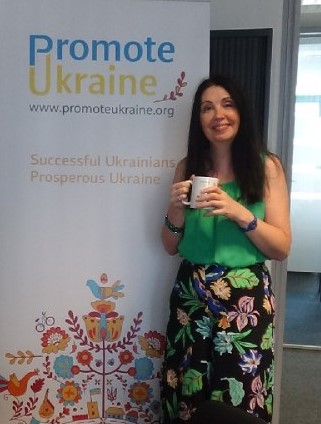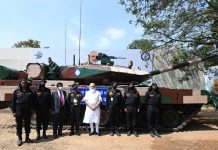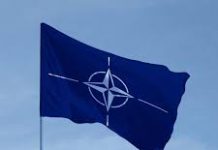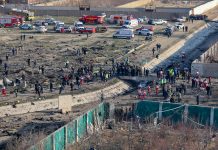The founder of the «Promote Ukraine» organization (Brussels) Martha Barandiy talked with the leading expert of the Center for European Policy in Brussels Amanda Paul. The Journalist offers you the original of the interview, previously published earlier in the Business Woman magazine.
– Amanda, thank you for willing to share your experience with our readers! We met on several high-level events here in Brussels where you moderated discussions related to Ukraine. Can you tell us more about what you do, how long have you been in Brussels and how is your work related to Ukraine?
-I to Brussels around 20 years ago after I finished studying in the UK.I was lucky enough to get a job at the Centre for European Policy Studies(CEPS) where I stayed for 5 years. During this time, I had the opportunity to work on Turkey which strengthened my interest in the country. I wrote my master thesis on Turkey’s relations with the EU. Turkey is a strategic country and every angle of its domestic, foreign and security policy is very interesting.
Following my period at CEPS I went to live in Istanbul which gave me a further opportunity to deepen my expertise on Turkey. When I came back to Belgium I worked very briefly in European Commission before starting to work at the European Policy Centre. Here I am responsible for Turkey and the Eurasia region, including Ukraine. I specifically focus on foreign and security related issues including conflict resolution in the former soviet space. In recent years I also began to cover issues related to counter-terrorism and jihadist radicalization.

– It is a wide range of responsibilities but as we touched upon Ukraine, was it also your desired area of expertise? Or it was given to you from above?
-I did not know much about Ukraine when I started to follow it. When the European Neighborhood Policy was introduced, the dossier landed on my desk.
This was when I met Kostyantyn Yeliseev, former Ambassador of Ukraine to the EU. He was a diplomat at the Ukrainian Mission to the EU at that time. He was an excellent source of information regarding Ukraine’s relations with the EU at that time. I got intrigued by Ukraine in a similar way to Turkey.It is a big and important country, with a very interesting geopolitical trajectory, As Turkey, Ukraine also wants to be a member of the EU.
As EPC started to organize more events on Ukraine, I got more engaged, I started reading books and writing commentaries and publications.
One of my first encounters with Ukraine’s political elites was when ViktorYanukovich came to the EPC to give a speech prior to the Orange Revolution, hence a few months beforeViktor Yushchenko became president. I wrote my first paper on Ukraine for this event. It was a background paper about the upcoming election.

– You mentioned Kostyantyn Yeliseev, which role did he play in your relations with Ukraine?
-During the time when Kostyantyn was the ambassador here in Brussels he used to call me now and then and say: “Amanda, what are you going to do for Ukraine today? When you get up in the morning, the first thing I want you to think «What can I do for Ukraine today?» He can be an extremely funny man!
– Do you sometimes wake up with those thoughts? Have you ever?
-Yes, I guess at some points I actually I was. Particularly during and after the Revolution of Dignity (Maidan).Kostyantyn was very motivated to get people support Ukraine,particularly during these crucial periods.Kostyantynwas a very active Ambassador. And MykolaTochytskyy, the current ambassador is also active. I have found that the quality of Ukrainian diplomats posted in Brussels has been really good. I had the good pleasure to work with many including LiubaNepop, VsevolodChentsov, VasylFilipchuk, NazarBobitski and Oksana Diakun.
-Who else shaped your feelings about Ukraine?
-A few years ago, when the EPC was working on a number of different projects related to Ukraine, we were looking for a new programme assistant. One candidate stood out from the rest. This was VasylBelmegaand he was offered the post. Vasyl, who eventually became one of my best friends, had a big impact on my life and our work on Ukraine. He represented a new generation of Ukrainian. Extremely smart and ambitious and through him I was able to further deepen by engagement and knowledge and understanding of the county. Not least he was able to inform me of all the news coming from Ukraine; help me identify the best Ukrainian experts for events. We had many fantastic brainstorming sessions and spend many emotional moments during the revolution of dignity. He brought me closer both professionally and emotionally to Ukraine and it was an extremely sad day for me when he left the EPC.
Of other Ukrainian experts and contacts also helped me shape by views on Ukraine and to those people I am also very grateful. This includes the Ukrainian diaspora in Canada. I had the wonderful opportunity to travel to Canada three times to take part in activities organised by the diaspora who were able to give me their stories and insights on Ukraine.

– As a woman having three children, how do you combine your work and family life?
-Working in a think-tank is flexible, we do not have rigid hours. At EPC we work from 9 to 6 but we have the flexibility to work from home. My work involves a lot of outside meeting and travelling so this flexibility is important. I feel extremely lucky to work at such an amazing think tank with such great colleagues. Given that I am a single mother of three children, this flexibility is very important
Such flexibility also has a lot to do with the nature of my job which includes writing policy papers and other publications. Writing, publications is a great channel to raise your profile.
– Writing – is it how you developed your expertise?
-I developed by expertise as a result of working on the same issues and regions for many years and by engaging with other people who are working on the same topic from different angles. I also worked as a columnist for 9 yearsfor a newspaper in Turkey where I was writing twice a week on issue related to current affairs, and developments in the region. Working for a newspaper was a great exercise. Not only did it develop my knowledge because I had to write on issues I was not familiar with but is also taught me to write short and punchy articles.
I also went (and still do) through big phases of reading books on history and politics of Ukraine, of Russia, of Iran. I have followed the work of some of the best experts, for example I really like the work of James Sherr, who I think is a brilliant analyst on Russia. I read a lot when I am in the learning curve about new topics I have to deal with.

– Is Ukraine still popular in Brussels?
-After the Revolution of Dignity Ukraine became the topic of the moment and many experts popped up. Many more than there were before. Suddenly everybody had to become an expert on Ukraine, for many different reasons in getting finance for projects. Writing about Ukraine helped to raise profiles. The number of experts and events in Brussels really quadrupled. In the EU institutions, Ukraine is still very much on the agenda. Today there is unprecedented political and economical support for Ukraine from the EU.
– Have you been to Ukraine?
-Even though I worked on Ukraine for quite a while my first visit was only in 2009. It was difficult for me to travel anyway due to family commitments before that.
It was such happy moment for me the first time I stepped off the plane into – as a Polish friend of mine and myself used to call Ukraine – the “Promised Land”. During that first visit, which took place during a cold and snowy February, I got out of bed at 06h00 before the conference just to walk around Kyiv. I remember thinking it was beautiful and magical city. I fell in love with Kyiv, with Ukraine.
I like the people, the country and have travelled throughout.. I took my eldest daughter on holidays to Crimea, she loved it. We took a trip around Crimea with the train. It was a wonderful experience for her. We travelled all over including to Sevastopol, Yalta, obviously before the Russians illegally occupied it. And you know, the Russian population living in Crimea had no problems, zero problems with Ukraine.
Although I am not Ukrainian, when Crimea got annexed I felt the deep trauma of my Ukrainian friends and incredibly sad.
– We met at the screening of the film Cyborgs and after the movie you told me that it was very emotional for you…
-I remember when the story was in the media, the guys were stuck in the airport, they could not get out of there as they were circled, when the floors collapsed one by one by one on top of them. When you see that again on film, it brings you back to that moment, and you remember how horrible it was. The time has moved on, and for a lot of people Ukraine does not figure on their minds any more, certainly not on the media. The fact that hundreds of people still die in the conflict zone every month since the beginning of the year, nobody know that any more.
The film was a good reminder of the scale of the war, of the sacrifice that ordinary Ukrainians made and continue to make for their country. These guys were not trained military soldiers, they were volunteers fighting for their country. So that film made me feel emotional. It was a nice film, but you know the situation is not over, the conflict still goes on. This month alone has a record number of Ukrainians who have died, what work is done about it?
I remember the Donbass as well. I do not recall there being tensions. I remember how alive and vibrant Donetsk was during the European football championships in 2012..There was no need for the conflict which has ripped Ukraine apart. It was a Russiaprovoked war, andwhoever says that this war is a civil war, says a nonsense.
– At your work you talk to representatives of the Ukrainian civil society but also to the governmental officials, what is the common feature that you see that does not let Ukraine move forward?
-I would not say that Ukraine has not moved forward because it has done. Important steps have been taken. Ukraine has huge economic potential but itneed to get rid of bad habits of the past.
It is a process, and after the Revolution the expectations of the Ukrainian society were extremely high that things would change very quickly. But that is not how things work, particularly in a country with Ukraine’s history of corrupted and criminal governance. It takes time andit takes a lot of political will and support. And you need to have all actors on board. Everyone has to have the same objective but there are many actors who do not want to change thestatus quo because they have vested interests. Other people recognize that things need to change but they are not ready to go the full distance.
In Ukraine it is about networks, it is about people who rely on other people to protect one’s interests, and those interests can become obstacles for real change. But that is not to say that nothing changed in Ukraine. I remember pre-Maidan era, I remember how the governance worked and corruption was everything. Things became better, transparency improved but there is still a long way to go.
But I guess, the progress is not always visible for the average Ukrainian citizen who wanted corruption to be totally removed, to have more money in their pockets. But this is a long-term process. It seems that the people became poorer, but these are the short-term sacrifices for long-term change. Ukraine’s leadership and Verhovna Rada need to maintain momentum in the reform process and they need to make a better job of communicating what it is doing.
– Do you see it changing? Do you feel the potential for the new generation to become better leaders?
-The future of Ukraine lies in the next generation. There are thousands of talented young people in Ukraine. That is why it is important to keep those people in the country. There is increasing trend of leaving the country and if this continues it will end with total brain-drain which would be a disaster for the country. There have to be mechanisms to keep them in the country. It is about speeding up reforms, finding job opportunities, creating SME-sector. President Poroshenko made a lot of big promises, he has delivered some of them but certainly not all He needs to make sure that he and the government maintain the momentum in the reform process and listen to what the international community, including the international institutions such as IMF and Venice Commission is telling them. Ukraine need become a resilient and prosperous state.

– You know, the President the second year in a row is proposing to adopt the law that foresees automatic loss of Ukrainian nationality for those Ukrainians who have got citizenship of other countries. This means that young people who plan to once come back to Ukraine, will no more plan to do so…
-Well, I believe this to be the wrong approach. Rather than cutting off citizenship it would be better to address the real problem which is why they leave in first place. He needs to create the conditions, the environment for Ukrainians to stay and encourage the ones who have gone to come back.
Threatening to take away nationality is not answer.
– And one more, last question, Amanda, what would you wish to the Ukrainian women who have active position in life?
-Today in Ukraine you have a lot of successful women. Unfortunately, men dominate in politics, but things are changing and of course this situation is not different to many countries in the EU.
But you have strong and intelligent women like Ivanna, the vice-prime-minister, and many others like her not only in the government and in the Rada,but also in civil society, media and elsewhere who do an amazing job. You also have great representatives of Ukraine working outside the country in NGO sector, for example,Olena Prystayko who is head of the Ukrainian think-tanks Liaison Office, and Svitlana Kobzar who works at the European Endowment for Democracy and Maryna Iaroshevych from the Ukrainian World Congress and OrysiaLutsevych from Chatham House. They are all examples ofwonderful, smart, Ukrainian women.
If you are a woman and you want to do something you should not let anybody or anything hold you back. Women are powerful, they are compassionate and generally more multitasking than men. If you saw how active Ukrainian women were during Maidan, gave support, helped with humanitarian issues… Women at Maidan played key role. The role of women should never be underestimated.
– Thank you, Amanda for a sincere talk!
Подписывайтесь на telegram-канал journalist.today








